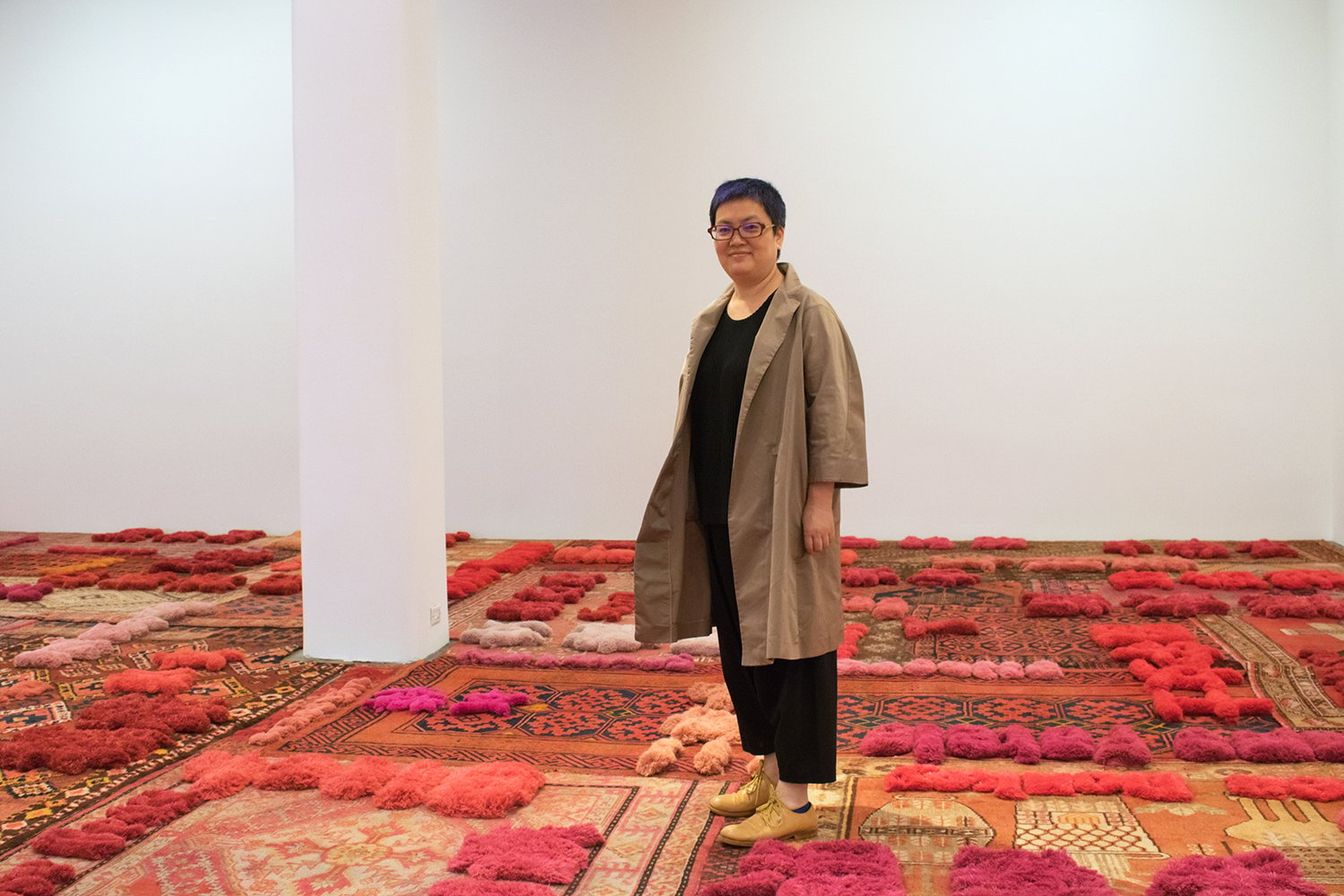
Peer in the window of Galerie Lelong in New York and you’ll see visitors standing reluctantly near the entrance, unsure of how to proceed and afraid to touch the art that lies at their feet. But Lin Tianmiao’s Protruding Patterns, now on view at the gallery, is meant to be touched—in fact, it’s designed to be walked all over.
The Chinese artist has created a gallery-filling installation made entirely of antique carpets. Stitched together, they are embroidered with dozens of words about women in Chinese, English, French, and other tongues—a selection of some 2,000 phrases the artist has collected over more than five years.
“The negative words are obviously more pronounced,” Lin admits to artnet News of the often-sexist lexicon, which ranges from obscure sexual slang (“hamburger”) to terms of endearment (“goddess”).
Lin Tianmiao, Protruding Patterns, installation view (detail) at Galerie Lelong & Co., New York. © Lin Tianmiao. Courtesy Galerie Lelong & Co.
Each word is embroidered in chunky bubble letters—a specially designed font—that jut out from the surface of the surrounding rugs, making the piece somewhat awkward to traverse. Lin previously showed Protruding Patterns at the Ullens Center for Contemporary Art in Beijing and the Long Museum in Shanghai. She claims the letters were even more voluminous before being trod upon by museumgoers.
When Lin set out to turn her collection of words—culled from novels, newspapers, the internet, pop culture, and everyday conversations—into an artwork, antique Chinese carpets seemed a natural backdrop. She appreciated the cultural importance of carpets in her native country, and wanted to imbue the work with a sense of history—a nod to the way in which language evolves over time.
Lin Tianmiao, Protruding Patterns, installation view at Galerie Lelong & Co., New York. © Lin Tianmiao. Courtesy Galerie Lelong & Co.
Even though women are still often referred to in derogatory ways, “I like to focus on how much progress society has made,” Lin says, pointing out that life would have been very different for the women who wove the 100-year-old rugs that make up the work’s foundation. She hopes Protruding Patterns will help highlight how women’s roles in society are changing, even in countries as different as China and the US.
Just don’t call Protruding Patterns a feminist work. “The label feminism restricts the interpretation of my work, and how I think about it,” she says.
One of China’s leading contemporary artists, Lin’s work is also included in “Art and China After 1989: Theater of the World,” the massive survey of Chinese art currently on view at the Solomon R. Guggenheim Museum in New York. Her work at the Guggenheim, Sewing (1997), also embraces traditionally feminine practices such as embroidery. It is made from a child-size Maoist-era sewing machine, wrapped in white thread with a video of a pair of hands guiding fabric through the machine projected under the needle.
Lin Tianmiao, Protruding Patterns, installation view at Galerie Lelong & Co., New York. © Lin Tianmiao. Courtesy Galerie Lelong & Co.
A carpet aficionado and collector, Lin assembled the rugs in Protruding Patterns, like the words in the installation, over a period of years. “They each have their own story,” she says, and no two feature the same pattern, she says.
The oldest and most expensive carpet is from the Forbidden City in Beijing, which Lin purchased at auction. It dates back some two centuries and features dye made from crushed coral. “It’s the type of carpet only the Empress would have been able to use!” Lin says.
Lin Tianmiao, Protruding Patterns, installation view at Galerie Lelong & Co., New York. © Lin Tianmiao. Courtesy Galerie Lelong & Co.
The words in the installation have their own, more recent histories. Lin found that some were very specific to their language of origin, while others appeared in multiple countries, sometimes with the same meaning.
The phrase “tiger mom” has been adopted by English speakers from China, for instance, while “Bossy” has become such a well-known adjective in China that young people will insert the English word into their everyday conversations. “There’s no equivalent Chinese word for bossy,” said Lin. “The cultures are more mixed and intertwined than we think!”
Lin Tianmiao, Protruding Patterns, installation view (detail) at Galerie Lelong & Co., New York. © Lin Tianmiao. Courtesy Galerie Lelong & Co.
Though such globalization may seem a fairly recent development, aided by the instant dissemination of information online, Lin sees a longer history. She points out Western-inspired motifs visible in some of the antique carpets. “Globalization has actually been a continuing force,” she says. “It’s not recent.”
“Lin Tianmiao: Protruding Patterns” is on view at Galerie Lelong, 528, West 26th Street, New York, September 7–October 21, 2017.